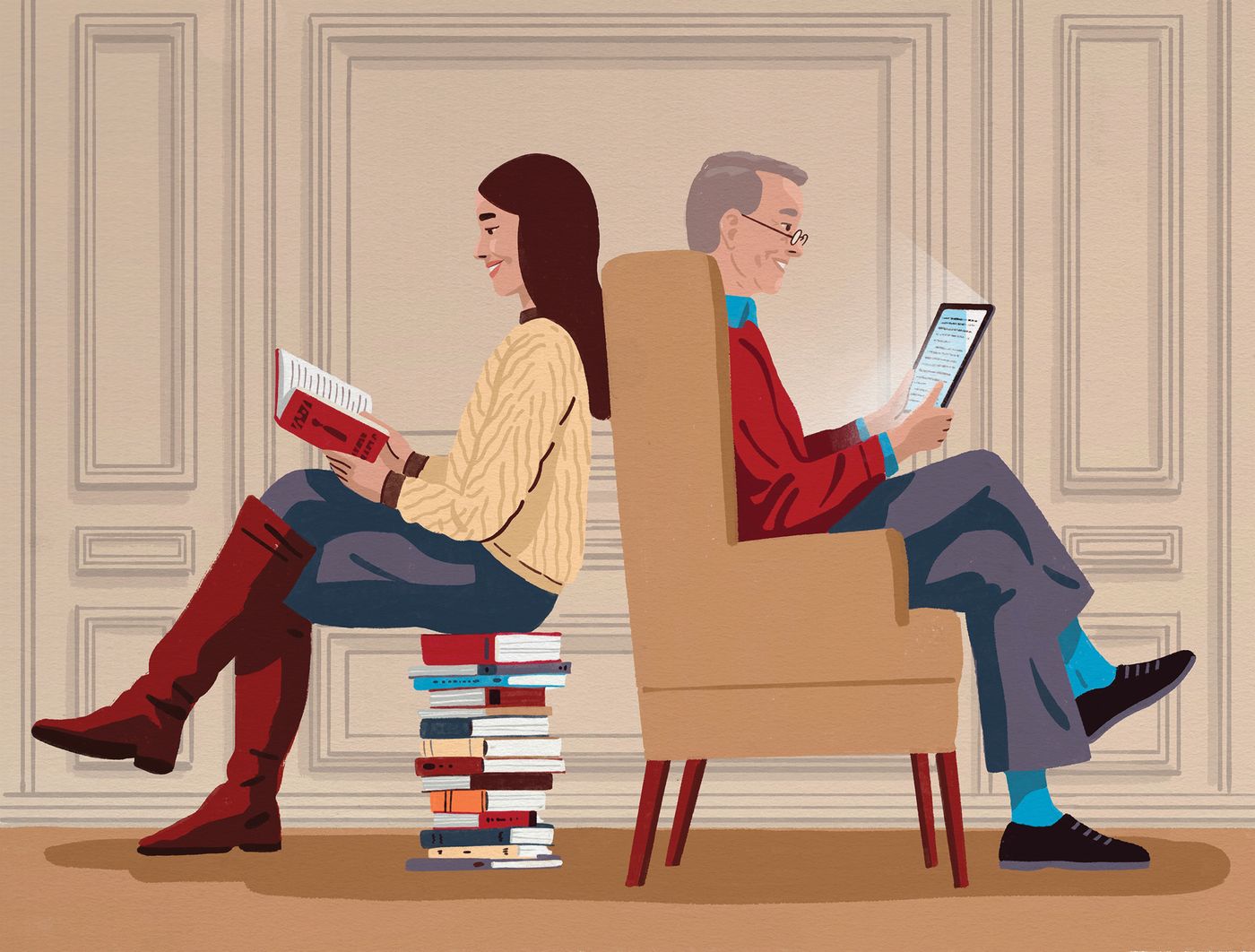While younger Americans value paperbacks as digital-detox tools, some older folks have quietly become e-book fanatics. A millennial explores the counterintuitive divide.
This article, by Perri Ormont Blumberg, originally appeared in the Wall Street Journal
My DAD AND I agree on most things: Bloody Marys are vastly superior to mimosas. On YouTube, “Yoga with Kassandra” beats “Yoga with Adriene.” The Yankees over…is there even a question? (This season, maybe.)
But we can’t seem to settle one debate: Are e-readers superior to physical books? I, a millennial, can’t get enough of hard copies, while my baby boomer dad is enamored with his Kindle Paperwhite (from $140), which uses a unique no-glare lighting system to replicate a traditional reading experience more closely than a phone or tablet. It’s tough to operate at first, he said, but you soon get the hang of it. He also likes that it lets him control the font and its size, as well as brightness. “And you can stop wherever you want—you don’t have to put a bookmark in it—and it’ll take you back there.”
I was surprised to learn that many in his generation seem to be on the same page. Amazon says more than one-third of Kindle customers are 55 or older.
Vicki Strull, a brand strategist and packaging designer in Atlanta in her early 50s, is a Kindle evangelist. She initially bought hers in 2012, as a gift for her middle-school-aged children. After the device had collected dust for two years, Strull brought it to the beach on a whim. She was hooked, especially since the Kindle’s waterproof “pages” wouldn’t disintegrate if her soggy kids dripped on them.
Once Strull became a Kindle convert, she purchased one for her parents, now in their mid-eighties, who she says love it and heavily rely on it. “When my mother wakes up in the middle of the night, she uses her e-reader,” Strull said. Since it lights itself, the Kindle doesn’t disturb her father’s sleep.Her kids don’t understand. “To this day,” she said, her now-high school- and college-age children “refuse to read a book on an e-reader.”
I can relate. I’ve tried a Kindle, but always miss the tactility of hardcovers or paperbacks. I love being able to scribble notes in the margins or fold over particularly captivating pages so I can revisit them later. Call me a Luddite, but the thought of my great-great-grandchild picking up my dog-eared and marked-up copy of Anne Morrow Lindbergh’s “Gift from the Sea” brings me great joy.
I don’t think that kid will ever find my equally loved copy of Heather Lende’s “Find the Good: Unexpected Life Lessons from a Small-Town Obituary Writer” in the magnetic dust of my long-dead Kindle.
Devin Smith, 26, a marketing and public relations manager in Brooklyn, N.Y., knows the appeal of print all too well, with more than 100 books crammed into her “tiny” apartment. “I love to collect all the books I have read as a tangible memento of the stories they represent,” she said.
Though reading is a solitary act, Smith says physical books invite connection with others. She likes reading on the subway and in parks and being stopped by those eager to know whether she’s enjoying the story or shares their (often strong) feelings about the author. “There’s something about the visual of a physical book that immediately opens you up to conversation with strangers.”
For other younger readers, a physical book offers a blessed break from a digitized life. Christopher Lee, 32, a health tech strategist in San Diego, finds reading e-books too much like work. “I try to consume and apply the information quickly,” he said. Hardcovers signal leisure and let him relax.“
“Easier on my eyes” is Erica Riley’s verdict on real books. The 29-year-old public relations professional in Morocco, Ind., also says she finds the motion of turning a page so much more satisfying than yet more tapping on yet another screen.
Interestingly, the option to tap, not page-turn, is what sold Frances Spillane, 57, a Boston mental health counselor, on e-books. With arthritis in her hands, hard copies trigger pain; she can read a book on her iPad’s Kindle app more comfortably. And the e-reader app lets Spillane quickly search and access the large collection of therapy books she needs for work wherever she happens to be.
Still, Spillane experiences pangs for the printed tome. “I miss the feel of turning pages,” she said. “I sometimes buy a physical copy of my favorite books, just to hold it in my hands.”
Even my e-book-devoted dad, who has kept a hard copy of “The Catcher in the Rye” handy as long as I can remember, would understand that.



